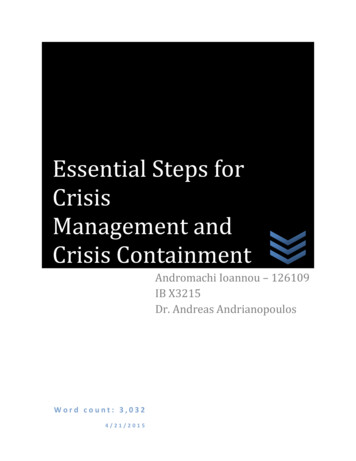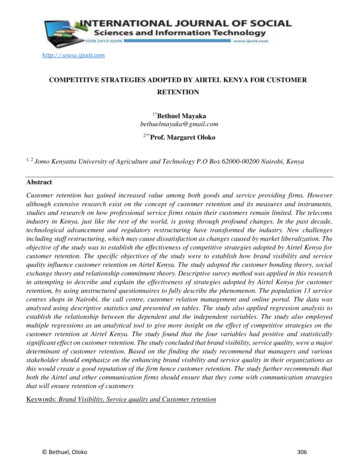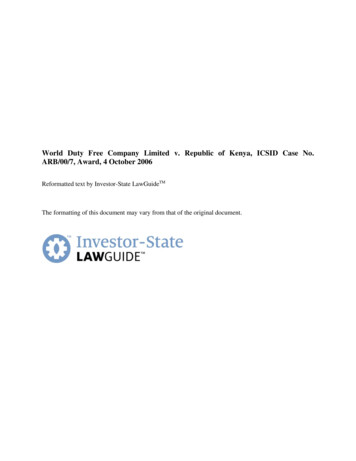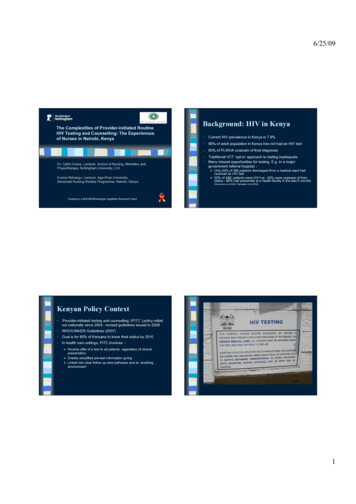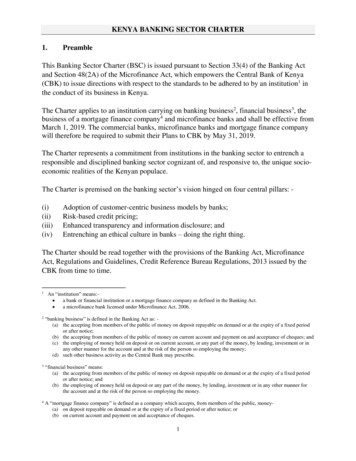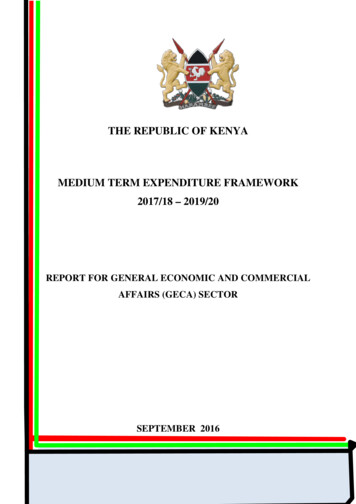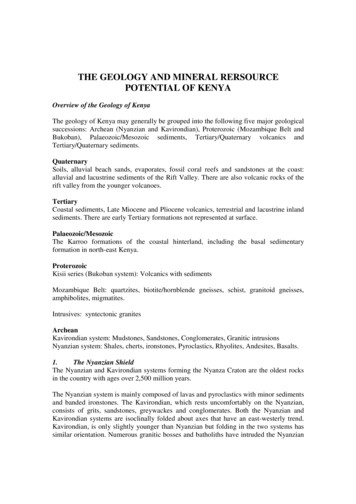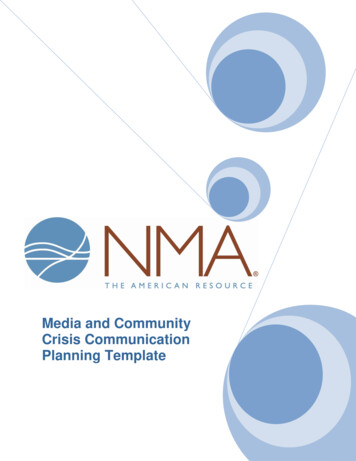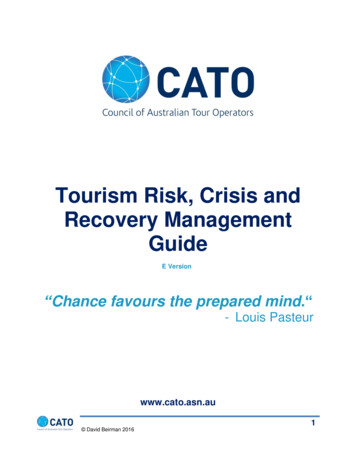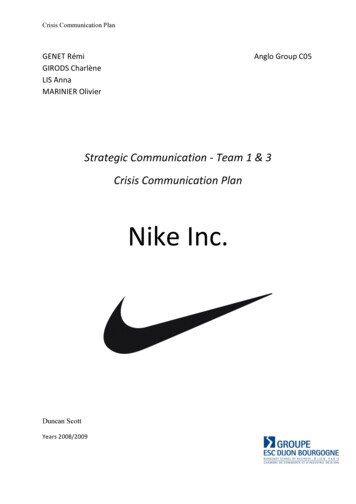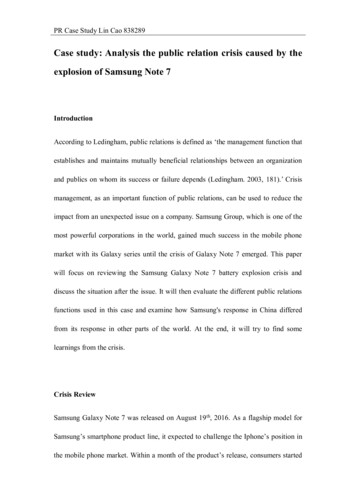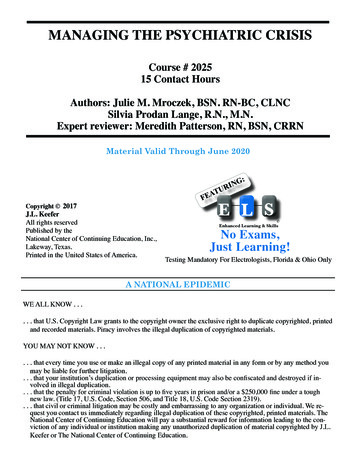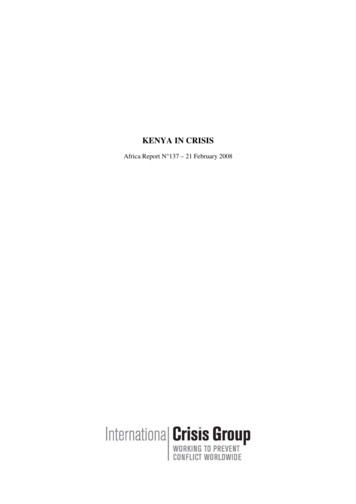
Transcription
KENYA IN CRISISAfrica Report N 137 – 21 February 2008
TABLE OF CONTENTSEXECUTIVE SUMMARY AND RECOMMENDATIONS. iINTRODUCTION . 1I.II. THE ELECTION CRISIS . 2A.B.A TIGHT AND TENSE RACE .21.Coalition building .32.The issues.4THE RIGGING OF THE PRESIDENTIAL ELECTION .6III. THE SECURITY CRISIS . 9A.B.PROTEST AND REPRESSION.9ESCALATION IN THE RIFT VALLEY .101.The rise of Kalenjin warriors in the North Rift .112.The return of Mungiki.133.Coast Province: the next theatre of violence?.15IV. HUMANITARIAN AND ECONOMIC CONSEQUENCES. 16A.B.V.THE HUMANITARIAN CRISIS .16THE ECONOMIC IMPACT .19THE SEARCH FOR POLITICAL SOLUTIONS . 21A.B.C.D.FIRST ATTEMPT AT A POLITICAL SETTLEMENT.21THE BALANCE OF FORCES.22ROUND TWO OF THE NEGOTIATIONS .24REBUILDING THE FOUNDATIONS OF STABILITY AND DEMOCRACY .251.The challenges of a power-sharing agreement.252.Incentives and dividends.263.Costs and punitive measures.27VI. CONCLUSION . 29APPENDICESA.MAP OF KENYA.30
Africa Report N 13721 February 2008KENYA IN CRISISEXECUTIVE SUMMARY AND RECOMMENDATIONSSince the announcement of the contested presidentialelection results on 30 December 2007 giving a secondterm to Mwai Kibaki, Kenya has been in its worst politicalcrisis since independence. Over 1,000 people have diedand 300,000 have been displaced in violence with a seriousethnic character. As former UN Secretary-General KofiAnnan conducts negotiations for a political settlement,calm has partly returned, but the situation remains highlyvolatile. To address the causes of the crisis, it will not beenough for the Annan team to broker a deal on themechanics of a transitional arrangement between politicalopponents and schedule negotiations on a reform agenda.A sustainable settlement must address in detail a programof power sharing, constitutional and legal reform andeconomic policies that convinces the drivers of violenceto disarm. For negotiations to succeed, the internationalcommunity must enhance its pressure, including aidconditionality and threats and application of targetedsanctions against spoilers.State authority collapsed in the political strongholds ofthe opposition Orange Democratic Movement (ODM).Supporters of its leader, Raila Odinga, took to the streetsin violent protest against the theft of the presidency andto seek revenge on the Kikuyu and Kisii communitiesperceived to be loyal to Kibaki. The security forces reactedwith great brutality and members of the communitiessupporting ODM were violently targeted by Kibakisupporters.Kofi Annan and a distinguished team of other Africanleaders have been mandated by the African Union (AU)to mediate the crisis. Soon after their arrival on 22 January,they arranged a meeting between Odinga and Kibaki andobtained pledges to negotiate a settlement. The parties haveconceded some ground and are discussing a transitionalarrangement which could lead to new elections after twoyears, legal and constitutional reforms, and a truth, justiceand reconciliation commission to assist in healing wounds.Serious obstacles remain, however. Armed groups arestill mobilising on both sides. ODM, which won a clearparliamentary plurality in December, has put on hold itscalls for mass action and is using the talks to restoreprestige it lost internationally in the violence. It is underpressure from its core constituencies, however, to demandnothing less than the presidency, and its supporters couldeasily renew violent confrontations if Kibaki’s Party ofNational Unity (PNU) coalition remains inflexible.The Kibaki coalition is buying time to wear down both theopposition and the international community’s resolve. Itbenefits from the presidency’s extensive powers, includingunlimited access to public resources. It insists the situationis under control and there is no power vacuum, tends totreat Annan’s mission as a sideshow while sponsoringalternative reconciliation processes, seeks to have Kibaki’selection recognised by neighbouring countries andcontinues to resist genuine sharing of executive power.While the mediation concentrates on a power-sharingagreement and a transitional arrangement leading to newelections, it has postponed equally important talks on thereform agenda and economic policy that an effectivetransitional government should adopt. A further year isenvisaged for these talks. This is a risky approach. TheAnnan team should engage the two sides immediatelyon these topics.Three complementary sets of issues must be addressedto finalise a detailed power-sharing agreement. The firstare the legal and constitutional reforms needed duringthe transition period, including a complete overhaul ofthe electoral framework. The second are the economicpolicies to be implemented during the transition. Thethird are the concrete details of the process to be followedto end the violence and to deal with the humanitariancrisis, including the institutional framework and timelines.The ODM and PNU do not control the local violence.There is a chance to restore state authority and preventrenewed major fighting only if local leaders understandthat their grievances are being addressed and concretemeasures are being rapidly implemented. Civil societyand economic stakeholders should also be associatedwith the negotiations on institutional reforms and economicpolicy.International pressure is critical to achieving these objectives.The conditioning of multilateral and bilateral financial helpfor a negotiated settlement should be reinforced by a
Kenya in CrisisCrisis Group Africa Report N 137, 21 February 2008general travel ban and asset freeze policy against thosewho support and organise the violence or otherwise blockthe political process. Some hardliners in Kibaki’s campdepend on international credit-worthiness to keep theirenterprises prosperous. The prospect of making individualspariahs can be used to encourage concessions in thenegotiations and good faith in implementation of anagreement.The stakes go beyond Kenya, whose political and economichealth is an essential ingredient for the security andprosperity of eastern and central Africa and indeed forhow the entire continent’s future is assessed by investors.Kenya’s stability determines regional access to energysupplies and basic commodities and guarantees a relativelysafe environment for hundreds of thousands of Somaliand Sudanese refugees. But concentrating on a powersharing arrangement between ODM and PNU will notbe enough to restore the situation.Page ii5.Ensure equal access and distribution of humanitarianand reconstruction resources to all victims of theviolence.6.Arrest and prosecute the leaders of the Mungiki sect,as well as politicians supporting its activities, so asto redress concerns about possible state support forits resurgence.7.Suspend immediately all police officers in chargeof the areas where extrajudicial killings haveoccurred, including Nairobi, Kisumu, Kakamega,Nakuru, Naivasha, Sotik and Kericho.To the ODM Leadership:8.Engage constructively in the negotiations andsupport the immediate opening of detailed talks onconstitutional reforms and the economic policies,to be carried out during the transition, with a viewto reassuring PNU hardliners over its economicpolicies as well as addressing the grievances of itsown hardline constituencies.9.Condemn publicly and threaten with sanctions anyODM leader inciting ethnic hatred, and expresssympathy for the Kikuyu victims of the violence.RECOMMENDATIONSTo the Annan Mediation Team of EminentAfrican Personalities:1.2.Propose to open three additional areas to beaddressed immediately and urgently as detailednegotiations on the structure and composition of apower-sharing arrangement continue:To the U.S., the EU and its Member States,Canada, South Africa and Other InternationalPartners:(a)constitutional and legal reforms, including acomplete overhaul of the electoral framework;10.Condition aid on the satisfactory conclusion of allthe above-mentioned elements of the negotiation.(b)economic policies, including immediate landacquisition and redistribution and major jobcreation programs; and11.(c)the framework and process for implementingcommitments for ending the violence andresolving the humanitarian crisis, includinginstitutions, timetables and internationalguarantees.Implement and expand the travel bans alreadyannounced by the U.S., Canada, the UK andSwitzerland by freezing the financial assets ofindividuals directly involved in or supportingviolence or otherwise blocking the negotiationprocess and publicly blacklist their companies onfinancial markets.Involve additional stakeholders from civil society inthe talks on legal and constitutional reforms andfrom the business community on economic policies.To the Kenya Government and PNU Coalition:3.4.Engage constructively in the power-sharingnegotiations and take the opportunity of discussionson constitutional reforms and economic policiesto negotiate guarantees for the continuation ofreforms started by the Kibaki administration.Restore security in the IDP camps and suspend allresettlement and relocation policies until a frameworkhas been agreed by the parties.To the Prosecutor of the International CriminalCourt (ICC):12.Open a preliminary examination of alleged atrocitycrimes committed in Kenya and take into accountthe findings and recommendations of the fact-findingmission of the Office of the UN High Commissionerfor Human Rights (OHCHR) once issued.Nairobi/Brussels, 21 February 2008
Africa Report N 13721 February 2008KENYA IN CRISISI.INTRODUCTIONThe announcement on 30 December 2007 by the ElectoralCommission of Kenya (ECK) that the incumbent PresidentMwai Kibaki was the winner of the presidential election hasplunged the country into an unprecedented political, securityand humanitarian crisis. Six weeks after proclamation ofthe contested results, protest riots, repression by securityforces and revenge killings by supporters of both campshave caused over 1,000 deaths and more than 300,000internally displaced persons (IDPs). The loss for theeconomy was over Ksh 100 billion (close to 1.5 billion)by early February 2008 and mounting. For one week inearly January, Rwanda, Burundi, Uganda, South Sudanand eastern Congo were short of fuel and other essentialcommodities because the Mombasa highway, their mainsupply route, was paralysed.The international community reacted swiftly to containthe crisis and put pressure on Kenyan leaders to end theviolence. After initially endorsing the election results,Washington backtracked, questioned their credibility andsent Assistant Secretary of State for African Affairs JendayiFrazer to support a negotiated solution. UK Prime MinisterGordon Brown called on the rival contenders to exerciserestraint and supported the good offices of the AU chair,Ghanaian President John Kufuor. UN Secretary-GeneralBan Ki-moon quickly condemned the violence andsubsequently visited Nairobi. A first round of discreetshuttle diplomacy produced an agreement of principleson a review of the election results and the negotiation ofa transition towards a settlement of the crisis. However,hardliners in the Kibaki camp convinced the president todisown the document.Both coalitions, the Orange Democratic Movement (ODM)and the Party of National Unity (PNU), include leadersfrom the largest communities of the country but aresupported by ethnically-rooted political constituenciesthat include fanatical followers. For PNU they are theKikuyu, Embu, and Meru, who originate from the Centraland Eastern Provinces and are strongly represented inthe Nairobi Area, Coast Province and the Rift Valley asa result of migration. ODM’s ethnic constituencies areLuo, Luhya and Kalenjin, who originate from Nyanzaand Western Provinces and the Rift Valley and areequally strongly represented in the major towns. ODMalso has a significant following among the coastal Muslimsand in North Eastern Province.I
safe environment for hundreds of thousands of Somali and Sudanese refugees. But concentrating on a power- sharing arrangement between ODM and PNU will not be enough to restore the situation. RECOMMENDATIONS To the Annan Mediation Team of Eminent African Personalities: 1. Propose to open three additional areas to be addressed immediately and urgently as detailed negotiations on the
